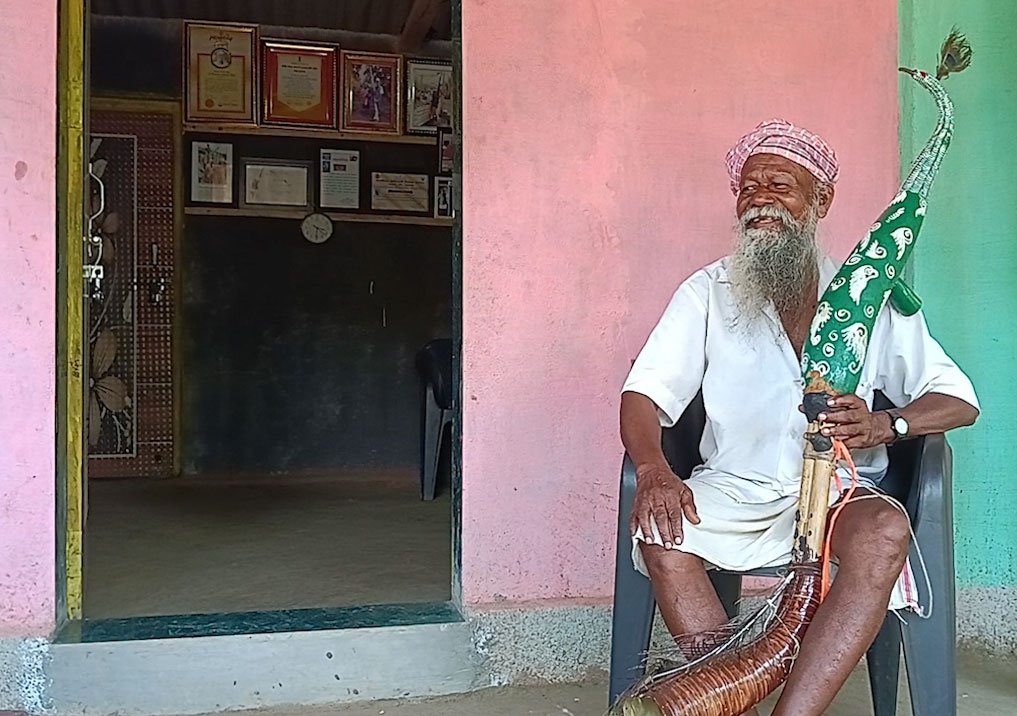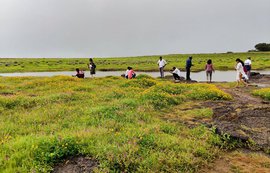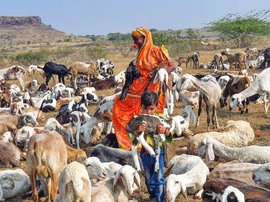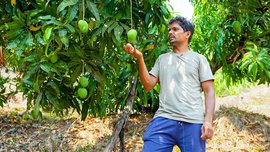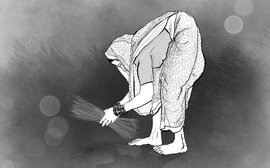Our Warli (also spelt as Varli) people get the wind inside their body when I play tarpa . For an hour, their bodies move [are possessed] just like a tree that moves with the wind.
When I play, I call upon Savari Devi and her companions. And my people get possessed by the one who responds.
It is all about faith. ‘ Maanal tyaacha dev, naahi tyaacha naahi [A believer has a god, an atheist has none]'. For me, my tarpa is my deity. So, I join my hands and worship it.
Navshya, my great grandfather, played the tarpa .
His son, Dhaklya. He played it.
Dhaklya’s son Ladkya. He too played it.
Ladkya was my father.
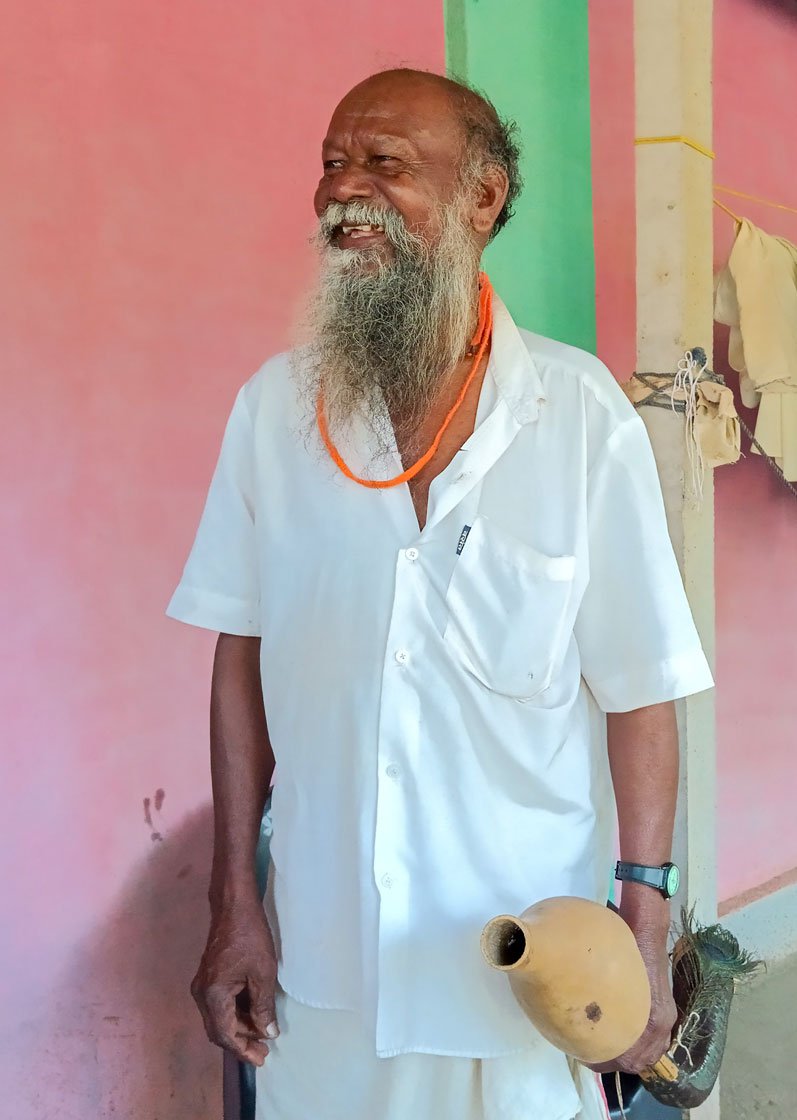
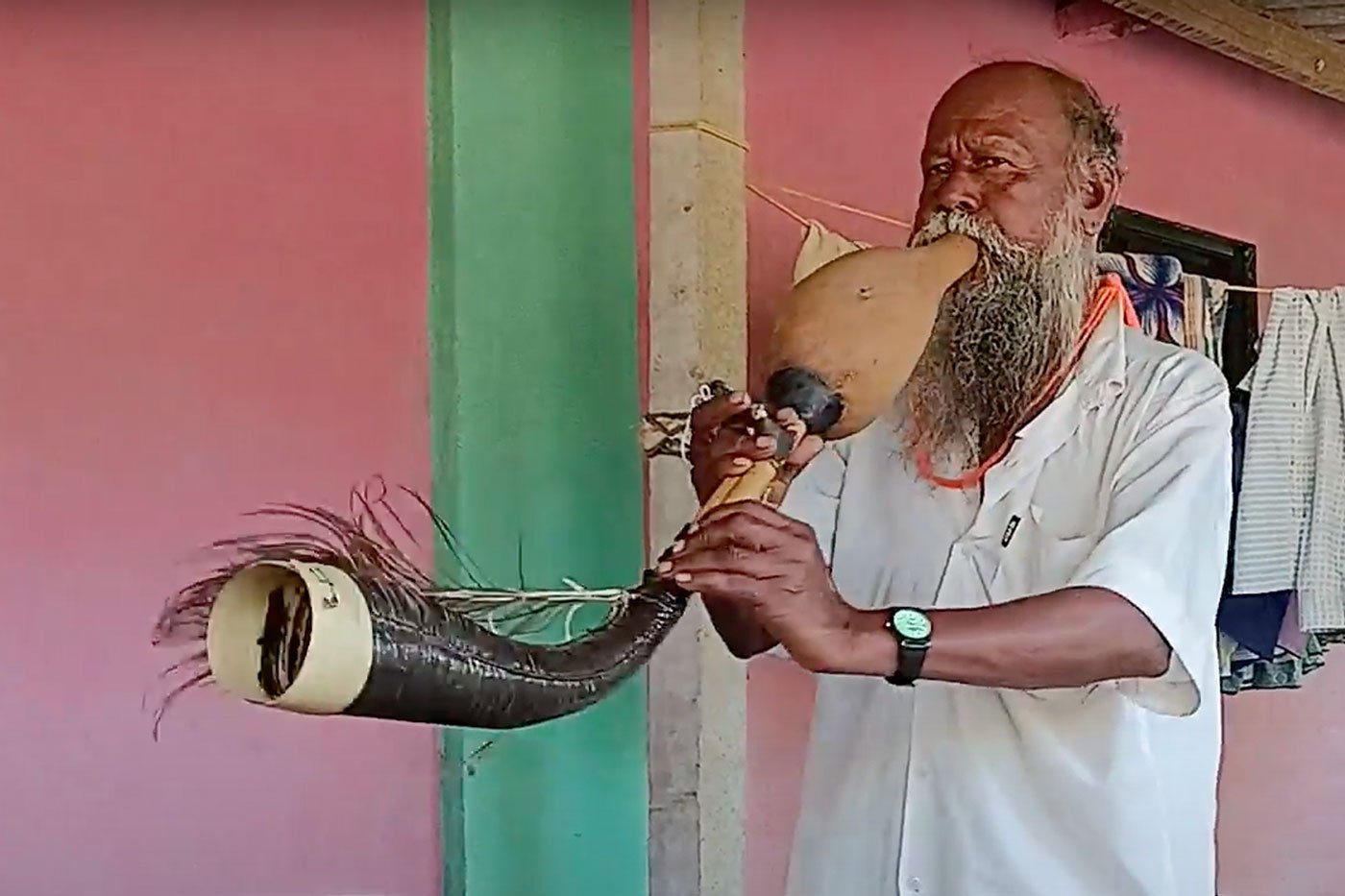
Bhiklya Dhinda’s father Ladkya taught him to play and make tarpa from dried palm toddy tree leaves, bamboo and bottle gourd. ‘It requires a chest full of air. One has to blow in the instrument and also make sure that your body has enough air to breathe,’ says Bhiklya baba
It was British rule. We had not attained freedom. In our village, Walwande, there was only one school for children of ‘big’ [upper caste] people. No school for the poor. I was 10-12 years old at the time. I tended the cattle. My parents thought ‘ gayimage gela tar roti milal. Shalet gela tar upashi rahal [if I tended the cattle I would get to eat. If I went to school, I would go hungry].’ My mother had seven children to care for.
My father would say, ‘You have nothing to do when cattle are grazing. Why don’t you play tarpa ? It helps your body [and health] and it also entertains you.’ Because of the sound no insects will come near the cattle.
I started playing it when I was in the forests and grazing grounds. People would complain, ‘for the entire day, Dhindya’s son was making noise – kyav kyav .’ My father said one day, ‘Till I am alive, I will make the tarpa for you. Once I am gone, who will?’ So, I learnt the art.
You need three things to make a tarpa . Leaves of the maad [palm toddy] tree to make the ‘sound’ [resonant horn chamber]. Two pieces of bamboo [cane], one for the female and one for male. The male has another small piece to tap and keep rhythm. The third thing that you need is dudhi [bottle gourd] for wind chest. When I blow into the blow hole the male and female unite and create the most attractive sound.
Tarpa is just like a family. There is a male and a female. When I blow some air, they unite and the sound that you get is magical. Like a stone, it is lifeless. But with my breath it comes alive and produces a sound, a musical note. It requires a chest full of air. One has to blow in the instrument and also make sure that your body has enough air to breathe.
It is the wisdom from god that we can make such an
instrument. It belongs to the god.
My father would say, ‘You have nothing to do when cattle are grazing. Why don’t you play tarpa ? It helps your body [and health] and it also entertains you.’
*****
My parents and old people told us many stories. If I share those today, people call me names. But these were told to us by our ancestors.
The gods left after the creation of brahmand [universe]. Where did the Warlis come from then?
From Kandram Dehlya.
The gods kept some curd for Kandram Dehlya with his mother. He ate the curd but also ate the buffalo. His mother got angry and threw him out of the house.
Our ancestors tell us how the first Warli, Kandram
Dehlya reached here.
कंदराम देहल्यालहून
पळसोंड्याला परसंग झालानटवचोंडीला नटलं
खरवंड्याला खरं झालं
शिणगारपाड्याला शिणगारलं
आडखडकाला आड झालं
काटा खोचाय कासटवाडी झालं
कसेलीला येऊन हसलं
आन् वाळवंड्याला येऊन बसलं.
गोऱ्याला जान खरं जालं
गोऱ्याला रहला गोंद्या
चांद्या आलं, गंभीरगडा आलं.
Kandram Dehlyalahun
Palsondyala parsang jhala
Natavchondila Natala
Kharvandyala khara jhala
Shingarpadyala shingarala
Aadkhadakala aad jhala
Kata khochay Kasatwadi jhala
Kaselila yeun hasala
Aan Walwandyala yeun basala.
Goryala jaan khara jaala
Goryala rahala Gondya
Chandya aala, Gambhirgada aala
This verse is a play of words rhyming with the
village and hamlet names in Jawhar block of Palghar district.
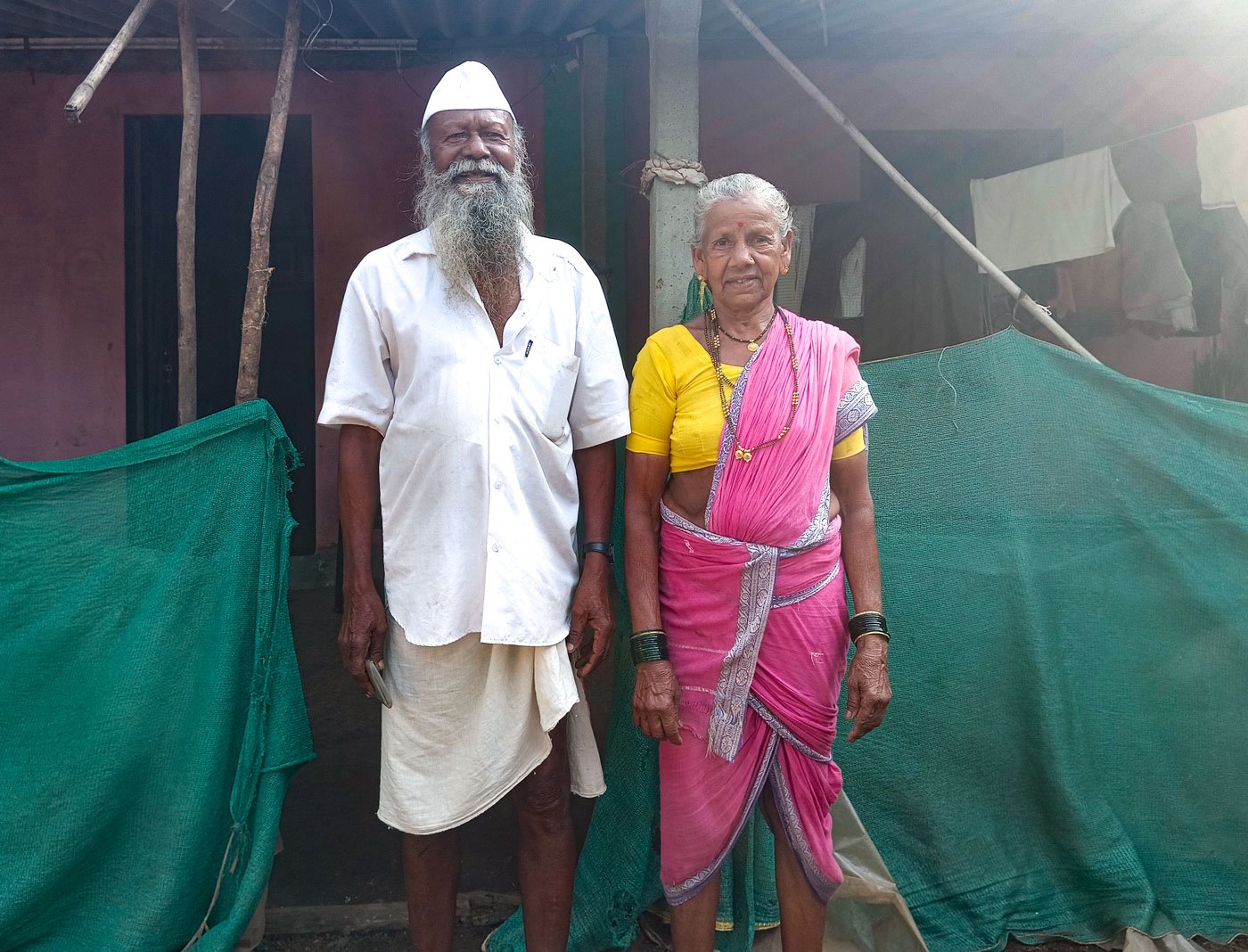
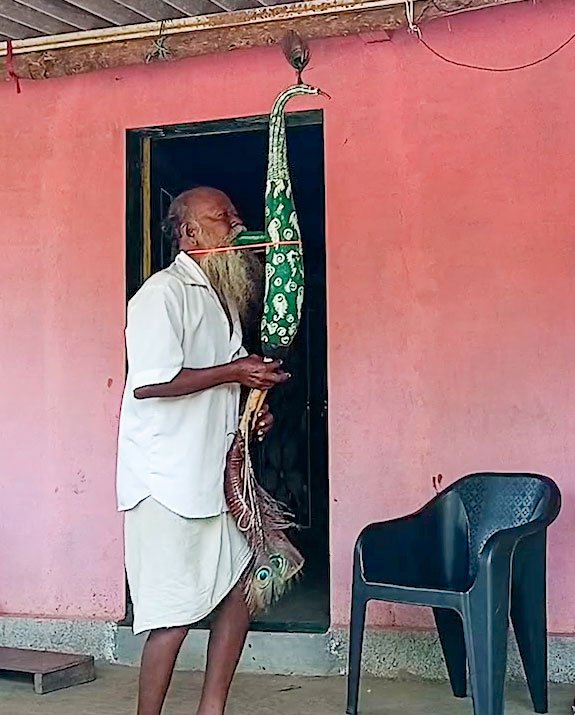
Left: Bhiklya Dhinda with his wife, Tai Dhinda. Right: He says, ' Tarpa is just like a family. There is a male and a female. When I blow some air, they unite and the sound that you get is magical. Like a stone, it is lifeless. But with my breath it comes alive and produces a sound, a musical note’
Like Warlis, many communities have lived here. Rajkoli, Kokna, Katkari, Thakur, Mahar, Chambhar…I remember I worked at maharaja’s [king of Jawhar’s] darbar [court]. He ate on karval leaves along with all the people who ate in his darbar . I worked there and threw away the used leaves. All communities gathered there and ate in one row. No one was treated less than the other. I learnt it there and began having water at the hands of a Katkari or a Musalman. Rajkolis do not accept water touched by Warlis. Our people do not drink water touched by Katkari or a Chambhar or a Dhor Koli. They still do not. But I never believed in such discrimination.
See, anyone who worships Hirva dev and tarpa is a Warli Adivasi.
We celebrate the festivals together. When new rice is harvested, we share it with the family, with the neighbours and take it first to the Gaondevi, our village deity. Only after offering her the first morsel, we eat it. You might think of this as andha-shraddha [blind faith]. But it is not that. It is our shraddha , our faith.
With the new harvest, we visit the temple of
Gaondevi
,
our local deity. Why did we construct a temple for her and bring her here? We
pray to her, ‘keep our children, relatives, cattle and labour, hale and hearty.
Let our fields and orchards flourish. Those who are in jobs, let them see
success. Let our families and our lives see good days.’ We Adivasis visit the
temple and pray to our deity, take her name and say our wishes.
![Bhiklya baba in the orchard of dudhi (bottle gourd) in his courtyard. He ties each one of them with stings and stones to give it the required shape. ‘I grow these only for to make tarpa . If someone steals and eats it, he will surely get a kestod [furuncle] or painful throat’ he says](/media/images/04-MK_and_SS-My_tarpa_is_my_deity.max-1400x1120.jpg)
Bhiklya baba in the orchard of dudhi (bottle gourd) in his courtyard. He ties each one of them with stings and stones to give it the required shape. ‘I grow these only for to make tarpa . If someone steals and eats it, he will surely get a kestod [furuncle] or painful throat’ he says
Tarpa plays an important role in our lives.
On Waghbaras , we celebrate Savari Devi’s festival. You know her as Shabari, one who gave lord Ram the half-eaten berries. We have a different story. Savari Devi was waiting for Ram in the forest. He came there with Sita. Savari met him and told him that she had been waiting for him forever and now that she has seen him, she has nothing else to live for. She took out her jeevda [heart] and kept it in his hands and went off, never to return.
To celebrate her love and dedication, we take the
tarpa
to the hills and forests. There, in the forest live many deities.
Tangda
Savari
,
Gohra Savari
,
Popta Savari
,
Tumba Savari
and
Ghunga
Savari
. All of them are Savari Devi’s friends. They are deities of nature.
They exist. Even now, they do. We started worshipping them. I play
tarpa
and invite them to the celebration. The way we call someone by name, I play
different tunes for each of the
savari
s. The tunes change for each one
of them.
*****
It was 2022. I was on the stage with Adivasis from all over: Nandurbar, Dhule, Baroda… The people sitting there in front asked me to prove that I was an Adivasi.
I told them that the first person who landed on this earth and tested its soil was an Adivasi, and that human being was my ancestor. I said, our culture is the sound we create with our breath. What we play with our hands is what you see in the painting. The painting came later. The breath and the music are eternal. The sounds have been here since the origin of the universe.
I ended by saying that this tarpa represents a couple, the male supports the female and the female supports the male. Tarpa works just like that. A breath unites them and creates the most magical sound.
My answer got me the first spot. I got my state the
first rank!
With folded hands, I used to tell my
tarpa
,
‘Dear god, I serve you, I worship you. Now in return you should also look after
me. I want to fly. Put me on an aeroplane.’ And, believe it or not, my
tarpa
took me on a flight. Bhiklya Ladkya Dhinda travelled in an aeroplane. I
visited so many places. I went to Alandi, Jejuri, Baramati, Sanya (Shani)
Shinganapur… I travelled far and wide. No one from here has been to Panjim, the
capital of ‘Goma’ [Goa]. But I went there. I have got one certificate from there.
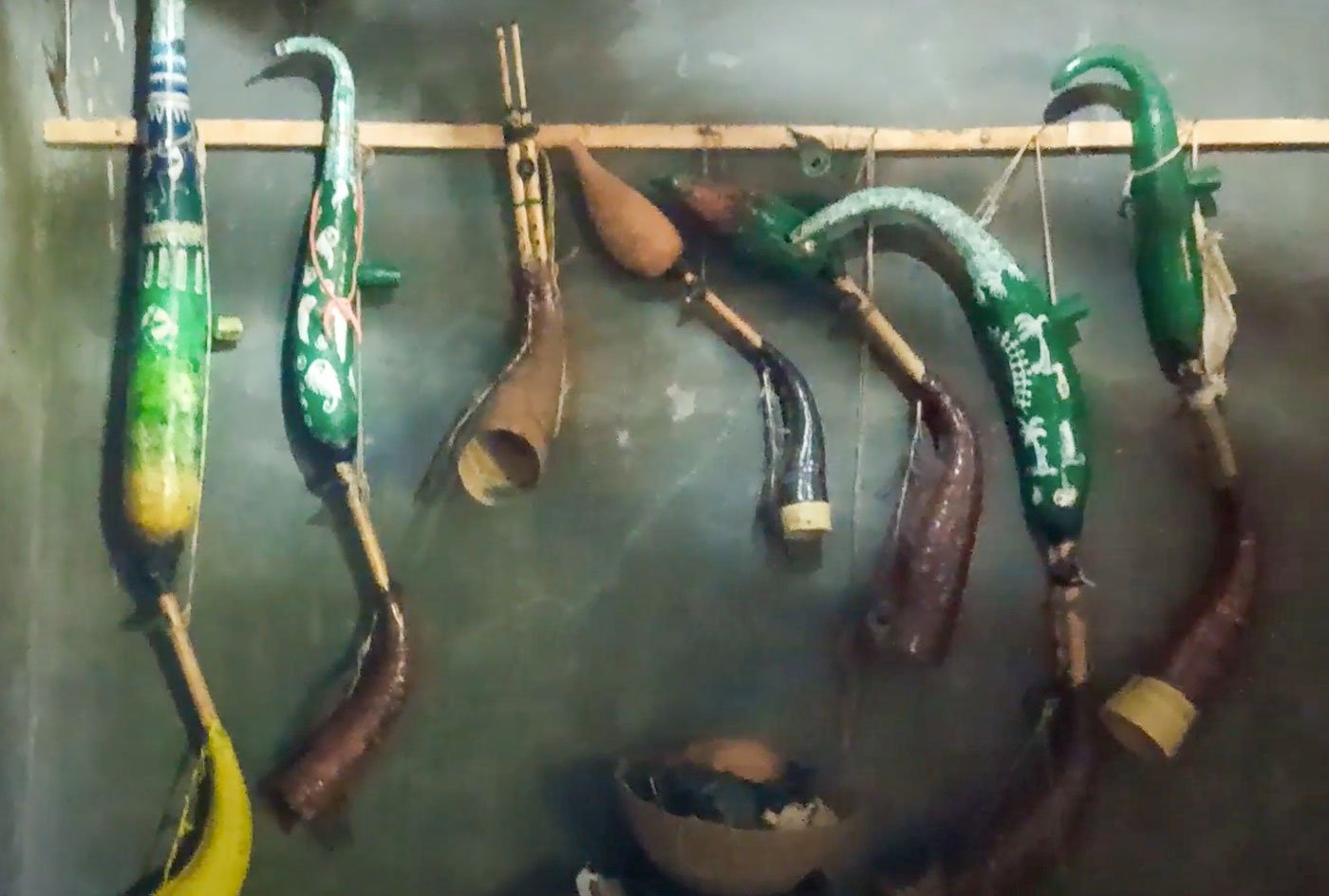
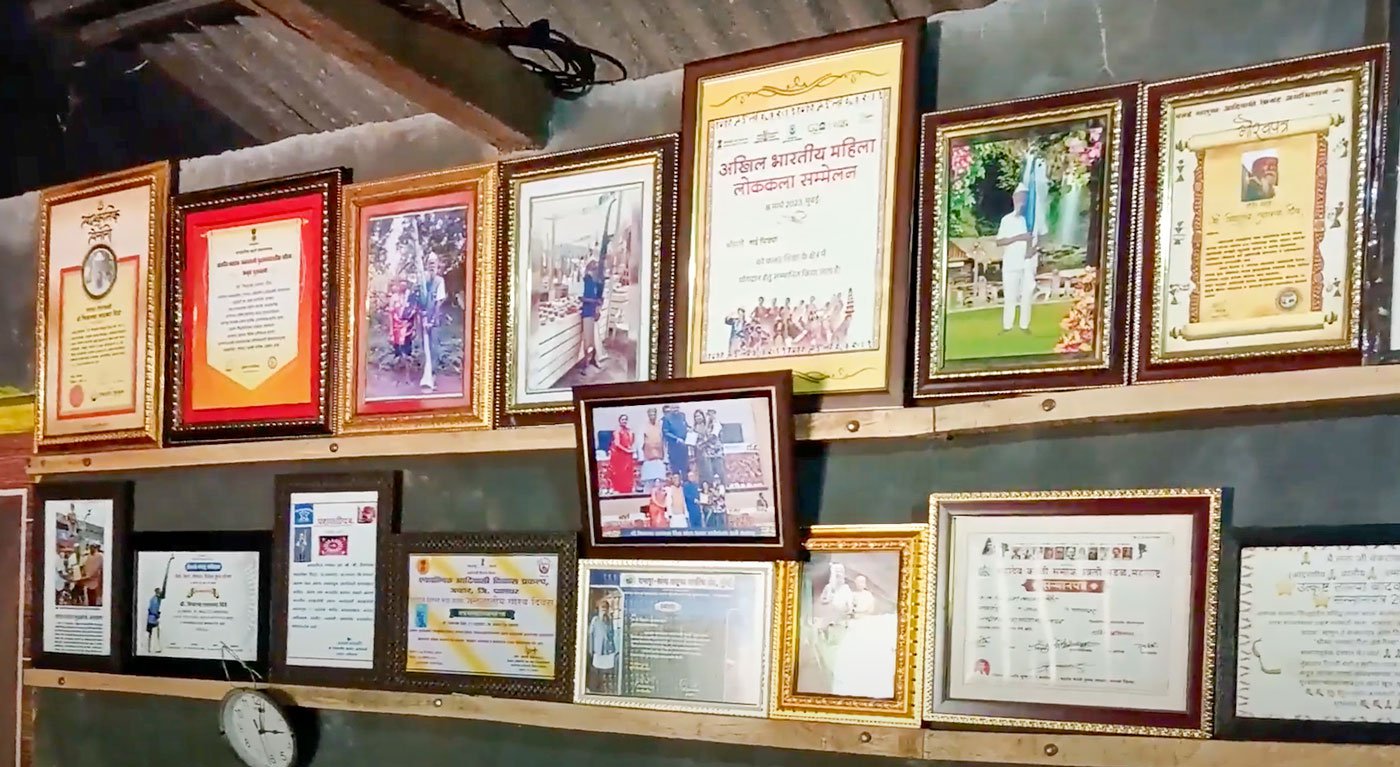
Left: The many tarpas made by Bhiklya baba. Right: He has won many accolades for his tarpa playing. In 2022, he received the prestigious Sangit Natak Akademi Award and was felicitated in Delhi. One wall in his two-room house is filled with his awards and certificates
I have many things to share but I don’t. I am 89 years old and there are so many stories. But I never tell them. I have kept them in my heart. Many reporters and journalists come and write down my story. They publish books and tell the world that they have made me famous. Many musicians come and try and steal my music. So, I don’t meet everyone. You are fortunate to have met me.
I got the Sangit Natak Akademi award. The function was in Delhi. When I received the award, my eyes welled up. My father never sent me to school. He thought I may or may not get a job with that education. But he told me that ‘this instrument is our deity.’ It is indeed a deity. It gave me everything. It taught me humanity. People know my name world over. My tarpa is printed on a post envelope [a postal stamp]. If you press a button in my name on your phone, you will see my video. What more do you want? A frog in a well does not know what is outside that hole. But I stepped out of that well. I saw the world.
Today’s youngsters don’t dance to tarpa tunes. They get the DJ. Let them. But tell me one thing, when we get our harvest from the field, when we take the offering of new rice to the gaondevi , when we take her name and pray to her, will we play the DJ? In those moments it is just the tarpa, nothing else.
PARI would like to thank Madhuri Mukane from AROEHAN for her help with this documentation.
Interview, transcription and English Translation: Medha Kale
Photographs and Video: Siddhita Sonavane
This story is part of PARI's Endangered Languages Project which aims to document vulnerable and endangered languages of the country.
Warli is an Indo-aryan language spoken by the Warli or Varli Adivasis in India residing in Gujarat, Daman & Diu, Dadra & Nagar Haveli, Maharashtra, Karnataka and Goa. UNESCO's Atlas of languages has listed Varli as one of the potentially vulnerable languages in India.
We aim to document the Warli language as spoken in Maharashtra.